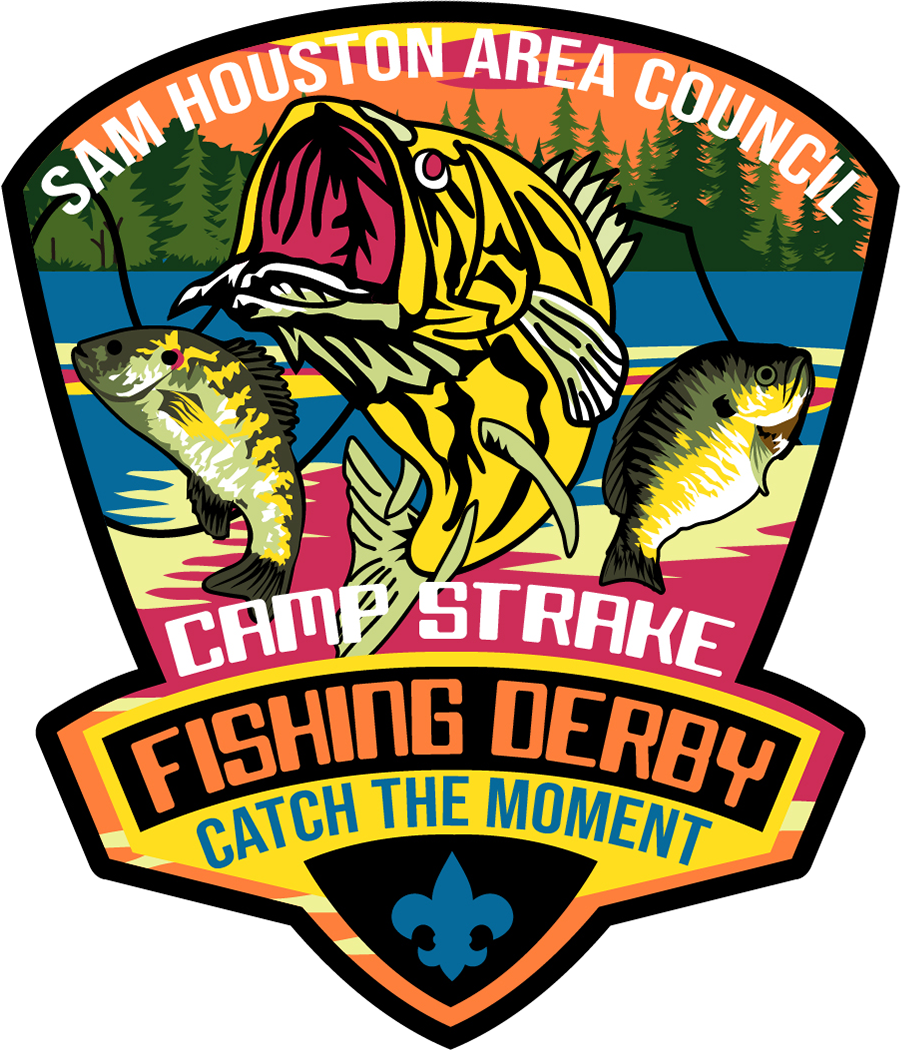 October 24, 2026
October 24, 2026
Fishing Tournament for Scouts in Troops, Crews and Ships
Get ready to cast your line at the Angler Classic, the ultimate fishing derby hosted at the breathtaking Camp Strake, where anglers of all levels will compete for bragging rights and exciting prizes! Nestled in the heart of nature's embrace, this event brings together passionate anglers for an unforgettable fishing experience. Bring your lucky fishing shirt and best fishing gear, and prepare for a day of fierce competition, stunning views, and unforgettable moments for a chance to reel in the big one.
Camp Strake, renowned for its scenic beauty and a large lake, provides the perfect backdrop for this thrilling competition. Armed with their fishing rods, Scouts will have a chance to showcase their skills and reel in the big catch in the spirit of friendly competition. Anglers will swap tales of their fishing triumphs while sharing tips and tricks to outwit their fellow competitors. Prizes will be awarded for various categories, including the largest, smallest, and most fish caught.
The council fishing committee and Sea Scouts are hosting the event.
 Questions and Support Schedule What to Bring Tournament Details
Questions and Support Schedule What to Bring Tournament Details

Registration
Registration can be completed by the troop, crew, or ship leadership or the parent/guardian of individual Scouts attending. A fishing license is not required. There are no arrangements or programs for Cub Scouts or siblings. Troops can camp for the weekend.
Merit badge classes will open after merit badge counselors have been recruited. An email will be sent when merit badge class registration opens.
New: Before attending a merit badge opportunity, "a Scout must meet with their unit leader or their delegate … this meeting is a required part of the merit badge process, and that it should be documented … in Scoutbook Plus or other method.” (Source, p.40, 7.0.0.3). Member ID Number: Have the Scout's member ID number ready before registering. The ID number can be found in Scoutbook (1. click on My Dashboard, 2. for a Scout - click on name of Scout, 3. select Edit Profile)
| $25 |
Scouts and adults participating in the tournament |
Includes lunch, the fishing tournament, and a patch.
Scouts can also attend a merit badge class. |
| $10 |
Adults not participating in the tournament |
Includes lunch. |
Sign up to be notificed when registration opens
Register (opens ~July/August)
Merit Badge Classes
What to Bring
Mark all items with Scout's name and unit number. Do not bring valuables.
- Annual Health and Medical Record (part A&B for all Scouting events) for every participant
- Download the Camp App for announcements (search "Sam Houston Area Council" on Apple or Android platforms)
- Fishing pole (some poles will be available for check-out on a first-come, first-served basis)
- Freshwater bait (e.g., worms, corn, jigs, spinnerbaits, crankbaits, topwater lures).
Live worms and corn to attract bluegill, along with plastic artificial worms for setting up a Texas Rig (a bullet-shaped weight, an offset worm hook, and a soft plastic lure to create a weedless bait) to target largemouth bass, will be available.
- Tackle box with hooks (barbless that use pliers to pinch down the barb, bobbers, weight sinkers, worm hooks) and pliers
- Activity uniform (Scout t-shirt) is recommended
- Lucky fishing shirt
- Closed-toed shoes
- Pen or Sharpie
- Cap or hat
- Sunscreen
- Water bottle - marked with name and troop # (one you don't mind losing)
- Water bottle clip to attach water bottle to belt loop or backpack, optional
- Sports drink powder packs for water bottles (not energy drinks), optional
- Backpack (day pack) - marked with name and troop # (one you don't mind losing), optional
- Drinks and snacks (cooler, optional)
- Hand sanitizer
- Paper towels or rags
- Insect repellent (non-aerosol) , optional
- Portable chair or camp stool
- Canopy, optional
- Documentation of any completed merit badge prerequisites.
- Read merit badge pamphlets online before camp.
- Class items required
- Note-taking items
- Writing utensils
|
| If camping with unit, bring: |
|
Personal Gear* (check with unit leader)
- Field uniform (Scout uniform)^
- Tent and ground cloth
- Sleeping bag, blankets, sheet
- Pillow
- Cot or pad
- Shoes (closed-toe) or hiking boots
- Pajamas or sleeping clothes
- Rain gear (pants and jacket)
- Personal items (e.g., deodorant, comb, medications, toothpaste, toothbrush)
- Personal medications: prescriptions (listed on medical form) and over-the-counter, in original containers
- Camping gear
- Mosquito netting
- Backup phone battery, rechargeable, fully charged, optional
- Spending money for trading post (cash, debit, credit), optional
|
Troop Equipment
- Trash bags, 55-gallon
- Ice chest
- Troop first aid kit
- Lanterns
- Lockable storage container
- Firewood (if no burn ban)
- Cooking gear and food for Saturday breakfast and dinner and Sunday breakfast (lunch will be provided)
- Hose, optional
- Hand washing station to put next to the water spigot, recommended (e.g., small bucket, bar of soap)
- Sports equipment, optional (e.g., Frisbee, football, soccer ball, kickball)
|
^The field uniform is not expected to be worn as part of the weekend programming, so check with the Scoutmaster before packing.
*Mark all items with name and troop number. Electricity is limited.
Don’t Bring: Valuables, electronics (e.g., iPad), fireworks, sheath or hunting knives, pets, hammocks, personal firearms and ammunition, jewelry, personal bows and arrows or hammocks.
#Bikes (non-motorized) are allowed on all paved roads to access the campsites and program areas and on the marked mountain bike trail by the bike barn. There are bike racks near the climbing tower, shooting sports area, Grand Pavilion, and campsites 1 and 20. All other trails, including sidewalks and grassy areas are off-limits. Helmets, proper safety protocols, and procedures are required at all times while riding bicycles. Learn more about BSA Bike Safety.
|
Camp App
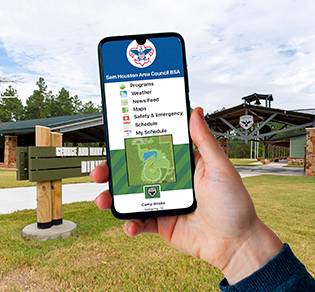 The camp app serves as a vital communication tool for all camp attendees, offering convenient access to essential resources such as the camp map, schedule, program updates, emergency announcements, and much more. You can find it by searching "Sam Houston Area Council" on both Apple and Android platforms.
The camp app serves as a vital communication tool for all camp attendees, offering convenient access to essential resources such as the camp map, schedule, program updates, emergency announcements, and much more. You can find it by searching "Sam Houston Area Council" on both Apple and Android platforms.
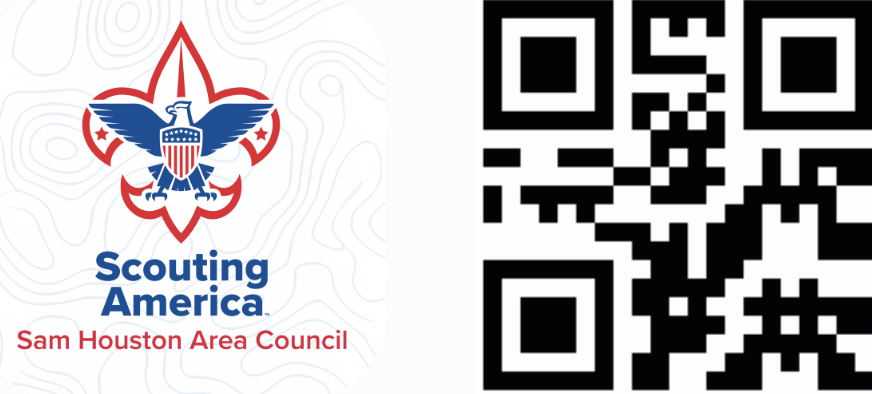
Schedule
Friday
|
|
| 6:30 - 8:30 pm |
Units camping check-in |
|
Saturday
|
|
| 7:00 - 7:30 am |
Saturday only participants arrive |
Park at Campsites 18, 19 or 20 |
| 7:30 - 8:00 am |
Tournament check-in |
Boat Pavilion (across from pool) |
| 8:05 am |
Opening flags / announcements |
Boat Pavilion |
| 8:15 -11:45 am |
Fishing Tournament |
Lake |
| 12:00 pm |
Lunch for all participants |
Dining Hall |
| 1:15 pm |
Awards Ceremony |
Dining Hall |
| 2:00 pm |
Merit Badge Classes (select the class during registration) |
Locations vary |
| 5:15 pm |
Closing Ceremony |
Boat Area |
| 5:30 pm |
Saturday-only participants depart |
|
Sunday
|
|
|
| 10:30 am |
Units break campsite and check out |
|
Fishing Tournament
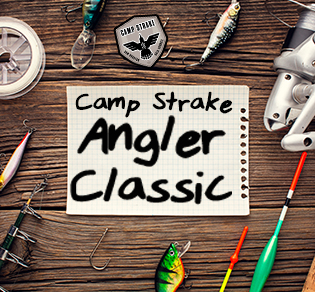 Two real baits will be available to participants. Live worms and corn to attract bluegill and plastic artificial worms for setting up a Texas Rig (a bullet-shaped weight, an offset worm hook, and a soft plastic lure to create a weedless bait) to target largemouth bass, will be available.
Two real baits will be available to participants. Live worms and corn to attract bluegill and plastic artificial worms for setting up a Texas Rig (a bullet-shaped weight, an offset worm hook, and a soft plastic lure to create a weedless bait) to target largemouth bass, will be available.
Awards
Awards will be given to both Scouts and Scouters in the following categories:
- Largest Bass
- Largest Sunfish
- Smallest Bass
- Smallest Sunfish
- Most fish caught – Strake Master Angler
- Overall Total Length of All Fish Caught
Scoring
Scoring will be done on the honor system. Each participant will be given a score sheet and a wooden ruler. Each participant will measure their fish and write down the length (to the closest ¼ inch) and species of fish.
Tournament Rules
- Only fish in designated areas; no wading in the lake.
- All fish must be caught with a fish rod or a cane pole; cast nets are not allowed.
- For a fish to count, it must be caught during the event time only.
- Scouts must catch their fish.
- All fish will qualify.
- Documentation of a catch will be done on the honor system – A Scout is Trustworthy. Scorecards and wooden rulers will be provided to each participant.
- Fish must be landed and measured to qualify.
- All fish will be measured from the nose of the fish to the tail (pinched together). A diagram is on the scorecard.
- This is a catch-and-release event. All fish must be returned to the water as quickly as possible.
- No treble hooks are allowed.
- Hooks should be barbless (use pliers to pinch down the barb…this causes less harm to the fish).
- All Scouts will be given a raffle ticket and entered into a drawing for additional fishing derby prizes. Scouts are only eligible to win one prize.
- All Scouts and Scouters must show good sportsmanship at all times.
General Information
- All Scouts must check in between 7:00 and 8:00 am on Saturday morning.
- Lunch is provided; additional meals are on your own.
- Park in front of the campsites; campsite 20 is closest to the lake.
- If a Scout is attending individually, they must have a buddy or parent/guardian with them and can check out after the awards ceremony.
- Troops, crews, and ships must provide appropriate leadership. Only Scouts with a troop, crew, or ship are allowed to camp for the weekend. Campsites and bathroom facilities must be cleaned prior to departure.
- All Camp Strake policies apply.
Buddy System
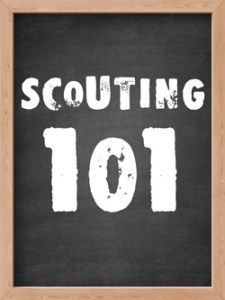 All Scouts should adhere to the buddy system throughout the camp. Scouting’s buddy system calls for Scouts to pair up with a friend or two for all activities. This helps ensure safety and accountability and teaches Scouts to have responsibility for others. No Scout should ever be found wandering through camp alone. It can be difficult to implement the buddy system when a Scout does not schedule classes with fellow members of their troop. Troop leaders are encouraged to pair Scouts in classes as much as possible. If this is not feasible, the Scout should walk with other Scouts in the class to the location of the merit badge class. Due to the number of Scouts and the short amount of time between classes, this should be a relatively simple exercise.
All Scouts should adhere to the buddy system throughout the camp. Scouting’s buddy system calls for Scouts to pair up with a friend or two for all activities. This helps ensure safety and accountability and teaches Scouts to have responsibility for others. No Scout should ever be found wandering through camp alone. It can be difficult to implement the buddy system when a Scout does not schedule classes with fellow members of their troop. Troop leaders are encouraged to pair Scouts in classes as much as possible. If this is not feasible, the Scout should walk with other Scouts in the class to the location of the merit badge class. Due to the number of Scouts and the short amount of time between classes, this should be a relatively simple exercise.
Merit Badge Counselors
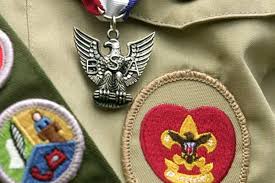
Merit badge counselors are needed to run the merit badge classes. Merit badge counselors must be registered with the council and have up-to-date Safeguarding Youth Training (SYT) taken at myScouting.org. It is our goal for the Scouts to be afforded opportunities to share resources from other troops with diverse occupations and skills. Participants will be expected to complete all the requirements as indicated by Scouting America. Merit badge counselors should wear their Scout uniform if possible.
The merit badge counselor is a key player in the advancement program. Whatever your area of expertise or interest—whether it is a special craft or hobby (basketry, leatherwork, coin collecting), a profession (veterinary medicine, aviation, engineering), or perhaps a life skill (cooking, personal management, communications)—as a merit badge counselor, you can play a vital role in stirring a young man's curiosity about that particular topic. By serving as a merit badge counselor, you offer your time, knowledge, and other resources so that Scouts can explore a topic of interest. If you are interesting in volunteering as a merit badge counselor and event volunteer, please note that in the registration link and the event chair will contact you.
Prerequisites, Requirements Not Covered and Partials
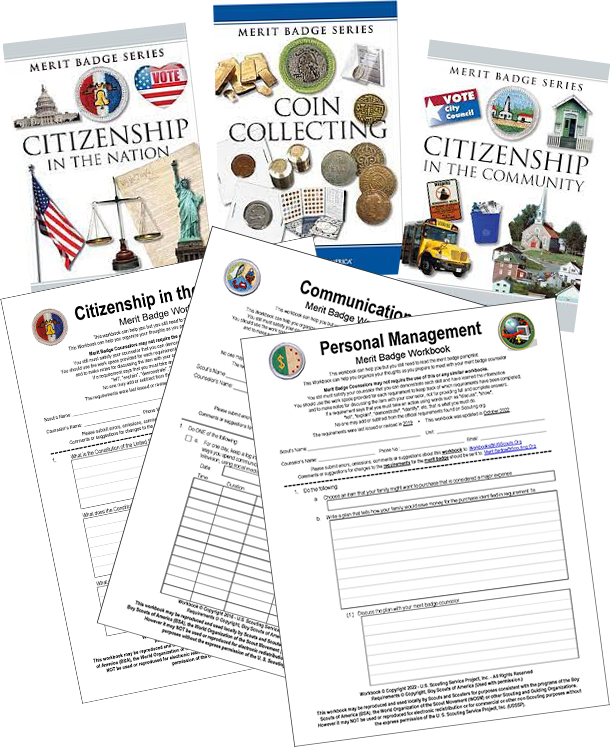
 Attending a merit badge class does not guarantee that a Scout will complete the merit badge, but it is an opportunity for Scouts to meet with qualified counselors, to help them work on the requirements needed to complete a merit badge. The merit badge fair should not be considered another school where the pupils sit and stare for hours on end. Scouts should come prepared to participate. The counselor's job is to encourage self-discovery and then check that each Scout has the minimum knowledge and does the requirements. Scouts should be ready to take notes and come prepared with notetaking materials and writing utensils. Remember one goal of the merit badge advancement system is to develop individual growth and initiative.
Attending a merit badge class does not guarantee that a Scout will complete the merit badge, but it is an opportunity for Scouts to meet with qualified counselors, to help them work on the requirements needed to complete a merit badge. The merit badge fair should not be considered another school where the pupils sit and stare for hours on end. Scouts should come prepared to participate. The counselor's job is to encourage self-discovery and then check that each Scout has the minimum knowledge and does the requirements. Scouts should be ready to take notes and come prepared with notetaking materials and writing utensils. Remember one goal of the merit badge advancement system is to develop individual growth and initiative.
Prerequisites: All Scouts are to read the merit badge pamphlet prior to the Merit Badge Fair. Merit Badge pamplets are available online. Scouts are to be prepared to answer the questions to each of the requirements before the merit badge fair; Scouts can complete the worksheets available at http://usscouts.org/usscouts/mb/worksheets/list.asp to help them prepare. Some merit badges require prerequisites that must be completed before the merit badge fair.
Merit Badge Worksheets
Requirements not covered: Some requirements cannot be completed during the class. The Scout should bring documentation of requirements not covered. Scouts are encouraged to complete requirements not covered before the event and bring proof of completion; otherwise, the Scout will receive a partial.
Partials: If the Scout does not complete the requirements not covered and bring documentation to the class, the Scout will receive a partial completion of the merit badge. The partial completion will be noted on the advancement report. Scouts will need to complete the badge with a registered merit badge counselor approved for that particular badge with their unit. Merit badge counselors are not usually available to serve as a counselor after the event unless arrangements are made with the counselor. Find a list of merit badge counselors by logging into http://scoutbook.scouting.org with your my.scouting userID and password, click on My Dashboard, Administration, your unit and scroll down the page. Remember that a youth member must not meet one-on-one with an adult. Sessions with counselors must take place where others can view the interaction, or the Scout must have a buddy: a friend, parent, guardian, brother, sister, or other relatives—or better yet, another Scout working on the same badge.
Merit Badge Completions
A few weeks after the event, all of the completed requirements will be posted in BlackPug, the registration site. A note will be placed at the top of this page when all the completions have been entered. The Scoutmaster, Committee Chair, or registrant contact (i.e., person who registered the unit for the event) can log in to BlackPug and view the reports.
How to View Reports
- Go to https://scoutingevent.com/000/Login/
- Click on profile name (top right)
- Click on View Activity (tabs: Summer Camp & Activities or Year Round Camping)
- Select the activity
- Click on Reports Tab (provide these reports to the unit advancement chair)
⇒ Unit Advancement Summary: summarizes all advancements completed at camp (e.g., merit badges, rank advancements)
⇒ Unit Advancement Detail: list of all advancements completed at camp in a grid (one page per Scout)
⇒ Scoutbook Export: is a report of all merit badge completions that can be uploaded into Scoutbook. Note: rank advancements have to be entered manually. This report exports merit badge data in Scoutbook format using Scoutbook's "advancement.csv" template. Chrome Users - an extension is available that allows direct import of this data into Scoutbook. This extension can be obtained here: Feature Assistant Extension for Scoutbook. Firefox Users - a similar extension for Firefox can be obtained here: Feature Assistant - Scoutbook. A document describing the upload process can be found here: Importing Summer Camp Data from Black Pug Software
- Video: How to view Reports
Registration Support
Helpful Registration Videos
Reports
A variety of reports are available:
| |
- Preparing for Full Throttle |
⇒ Class Schedule Checklist Sheet: report Scouts can use to indicate which classes they are interested in (print a copy for each Scout)
⇒ Unit Roster: Scoutmaster report with a list of all Scouts attending with check boxes to keep track of things like medical forms
⇒ Unit Roster Registrant: Scoutmaster report with a list of all Scouts by registrant type attending with check boxes to keep track of things like medical forms
⇒ Prerequisites by Scouts: a report for Scouts listing prerequisites they should work on before the event (one page per Scout).
⇒ Prerequisites by Unit: summarizes all prerequisites that Scouts should work on before the event, making it useful for planning troop meetings le |
| |
- Print Before Arrival |
⇒ Class Schedule or Participant Class Schedule: two types of reports for Scouts with their merit badge schedule (one page per Scout)
⇒ Scout Summary: summarizes all Scouts' schedules.
⇒ Period Summary: lists where every Scout should be each period.
⇒ Class Summary: lists Scouts taking each class
⇒ Scoutmaster QR Codes: QR codes for the unit and each Scout used to access class and merit badge schedules on mobile devices. |
| |
- After the Event |
⇒ Scoutbook Export: is a report of all merit badge completions that can be uploaded into Scoutbook so Scouts get credit for advancements completed. Note: rank advancements have to be entered manually.
⇒ Unit Advancement Summary: summarizes all advancements completed at camp (e.g., merit badges, rank advancements)
⇒ Unit Advancement Detail: list of all advancements completed at camp in a grid (one page per Scout) |
| |
- Resources |
⇒ Class Data: Excel report listing all Scouts and merit badge classes
⇒ Customer Invoice: shows all payments
⇒ Event Additional Fees: lists any additional fees |
Photography
Notice! Please be advised that promotional videotaping/photography may be in progress at any time at an event. Your entrance constitutes your agreement that the council has the right to reproduce your likeness in videography/photography for promotion (e.g., publications, internet, newspaper).
Scouting Safely
 Scouting America's Commitment to Safety is ongoing and we want you to know that the safety of our youth, volunteers, staff, and employees cannot be compromised. Scouting America puts the utmost importance on the safe and healthy environments for its youth membership. The Sam Houston Area Council takes great strides to ensure the safety of its youth as well as the adult volunteer leadership that interacts with them.
Scouting America's Commitment to Safety is ongoing and we want you to know that the safety of our youth, volunteers, staff, and employees cannot be compromised. Scouting America puts the utmost importance on the safe and healthy environments for its youth membership. The Sam Houston Area Council takes great strides to ensure the safety of its youth as well as the adult volunteer leadership that interacts with them.
Guide to Safe Scouting policies must be followed. All participants must follow Youth Protection Guidelines at all Scouting events. Highlights include:
- Two-deep leadership on all outings required.
- One-on-one contact between adults and youth members is prohibited.
- The buddy system should be used at all times.
- Discipline must be constructive.
Health and safety must be integrated into everything we do, to the point that no injuries are acceptable beyond those that are readily treatable by Scout-rendered first aid. As an aid in the continuing effort to protect participants in a Scouting activity, the National Health and Safety Committee and the Council Services Division of the National Council have developed the SAFE Checklist of safety procedures for physical activity. These 16 points, which embody good judgment and common sense, are applicable to all activities.
Youth Protection Guidelines Guide to Safe Scouting SAFE Checklist Enterprise Risk Management
Contacts
Questions and Support, click here